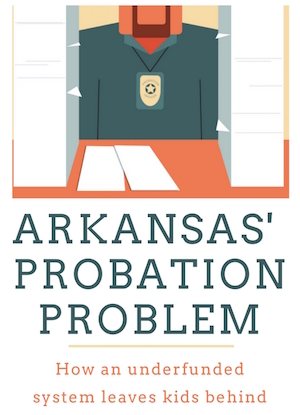In southeast Arkansas, school officials threatened to withdraw money for juvenile probation officers’ salaries as leverage for desired outcomes in juvenile court cases, a report found.
The 10th Judicial Circuit — Ashley, Bradley, Chicot, Desha and Drew counties — doesn’t have enough money to pay the officers, so school districts chip in.
Some schools pushed officers to arrest kids and have judges sentence them for the sake of convenience, according to the report by the Robert F. Kennedy National Resource Center for Juvenile Justice.
These cases could be as serious as a threat of a mass shooting or as minor as a few dress code violations and truancy.
In interviews with the Arkansas Democrat-Gazette , officials from all 10 school districts in the area denied this was happening at their schools.

Judges in the 10th Judicial Circuit saw a 187 percent increase in juvenile delinquency cases between 2005 and 2015, state records show. In 2005, 294 such cases were filed; in 2015, 845 cases went to court.
John Tuell, executive director of the nonprofit Kennedy resource center, said the judicial circuit’s agreement with the school districts put “immense pressures” on probation officers, who would speak only confidentially to resource center staff members.
The Boston-based Kennedy juvenile justice center researches and promotes the use of best practices in juvenile systems across the country and was paid by Arkansas court officials to conduct a study of juvenile probation in Pulaski and Sebastian counties and the 10th Judicial Circuit.
What happens to children in the juvenile justice system should be determined by the courts, with some input from the schools, Tuell told the newspaper.
“There was no such balance” in the 10th Circuit, he said.
“Schools expected them to do what they wanted,” he said. “They felt they would be out of a job” if they didn’t comply.
Tuell said it isn’t common for districts in other places to have such agreements with juvenile courts.
Circuit Judge Teresa French said her court’s probation officers think schools are sending too many basic disciplinary issues to court rather than dealing with them on their own.
“Kids are going to court for things like getting out of their seat, sagging pants, being disrespectful,” she said. “Once they have so many behavioral write-ups, they bring it to the court.”
The Kennedy resource center report outlined a lack of agreement between schools and the court on the purpose of probation.
Superintendents echoed this confusion in interviews with the newspaper. Many didn’t understand how the probation program was intended to work or what officers did in their schools.
Crossett school Superintendent Gary Williams said he’s heard probation officers complain about being pressured, but understands that schools don’t “feel like they got what they were hoping for on that expenditure.”
The Hamburg School District doesn’t plan to pay part of the probation officer’s salary beginning in the fall. Declining student enrollment has led to further budget constraints there. The board decided instead to use that money to pay for an armed law enforcement official to serve as a school resource officer.
After reading the Kennedy resource center report, Dumas school Superintendent Kelvin Gragg called a meeting with his principals to discuss its findings.
Gragg was troubled because the report “didn’t put the districts in a favorable light.”
“We’re about prevention. If we can figure out a way to get our students in school and to be productive in school, then we would prefer not to use the court,” he said. “We both need some direction moving forward.”